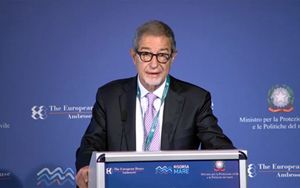(Finance) – At the end of first Ambrosetti Sea Forum intervened Senator Nello Musumeci, minister for civil protection and maritime policieswith a direct and timely message: “I believe I can tell you in advance that I will propose to the government, in the next session, to promote a law to amend the Constitution, to article 119. We will insert an amendment that says, in absolute summary: The Republic protects and enhances the sea. Period”.
Senator Musumeci is the political personality he has promoted and contributed to the implementation of the Government’s Sea Plan, the first activity of its kind which aims to bring the ministries into dialogue from a systemic perspective and of common interest on the valorisation of the sea resource. It is no coincidence that Nello Musumeci is also the main promoter of the Sea Forum, which closes its first edition today. The minister’s commitment is clear: to promote a maritime culture in a country, Italy, which bases its culture mainly on the mainland: “starting from primary schools, this government intends to promote a different approach [al mare]. Why do I say this? It has been reiterated in these two days, the sea has been the neglected element in the last eighty years, it has been neglected for a series of reasons including geoeconomic ones, for the polycentrism of continental Europe which has been concerned with looking towards the Baltic and towards the Eastern countries, initially leaving the Mediterranean to its fate and subsequently to the entry and protagonism of other economic and political powers”.
In short, the vision is the constant one of the Government and the industries protagonists of these two days: in a world in which energy supply is increasingly moving towards the south of the world, theItaly has the opportunity to become the bridge between two continents, becoming the main European energy hub. In fact, it is no coincidence that 10 development points have been included in the sea plan, and among nautical, cruise, shipbuilding, sports, fishing and marine biology, scuba diving emerges, that is, the exploitation of the seabed, the next frontier for the extraction of those rare earths so precious for the energy transition, both an opportunity and a threat for businesses, but in which the sea has a leading role: “the absence of an alternative fuel to fossil fuels, at least until now, brings the need to free the sea from waste, rivers heavily polluted due to the excessive anthropization of some areas. We have listened to the many requests that come from the business world. There is a common thread in all the interventions: less bureaucracy, less paperwork, fewer steps , less useless waste of time. And there is much, much work to be done on this.”
About the sea managementthe Minister did not neglect one of the main topics about which have filled the news in recent months, that is immigration: “I have always said, perhaps due to my Catholic faith, that a man at sea must always be saved, whatever the reason for which he is in that place; then the analyzes are done afterwards, but we have all been told about this agreement and I come from a political school that has never questioned this principle. If anything, the problem is understanding why that man is in the sea. That man in the sea should not get there. This is the issue on which we should we should confront each other.”
Closely related to the management of emergencies generated by immigration at sea, is the situation of port infrastructures in Italy, an essential element for addressing the current geopolitical situation: “This is the issue we should be discussing: port facilities, infrastructures and fishing, with the pitfalls that this ancient, centuries-old, thousand-year-old activity brings, which today experiences increasingly unscrupulous competition. The uncertainties on the Black Sea, what could happen after the war, the aggression against Ukraine, the ambitions of Morocco and Algeria and Egypt on ports make us reflect on how to defend this sea between two straits, Suez and Gibraltar, and the lack of interest that the United States has shown in recent years towards the Mediterranean?”
Minister Nello Musumeci then concluded: “so we all agree on at least one thing, the sea can become the new growth engine of the nation. In order to become this, regulatory interventions are also needed. A lot of passion is needed, a lot of good will is needed. It is needed , as Undersecretary Perego recalled, a convergence around a table which, on maritime policies, has been missing for eighty years”.
